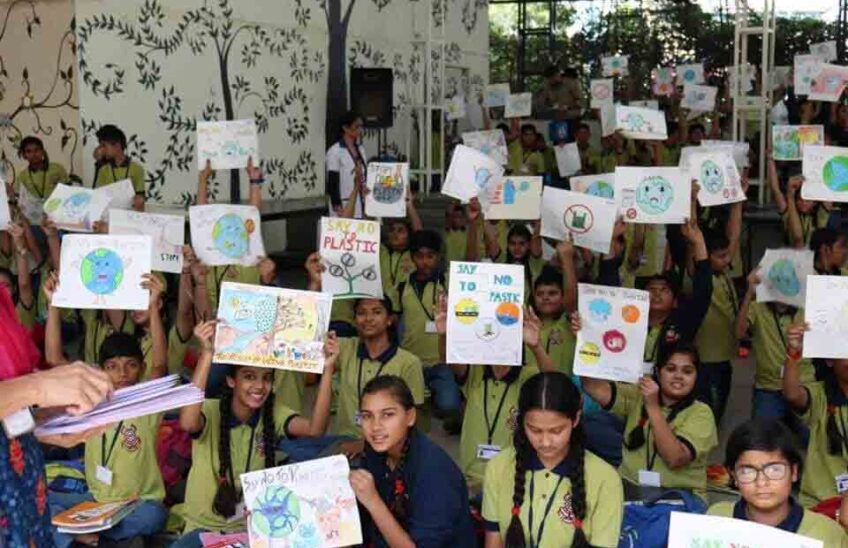
The holistic nature of the CBSE course materials entails a broader and deeper approach to teaching beyond the typical scholarly subjects, stretching to the overall character building of the students. An integrative curriculum that focuses on developing these traits will create a well-rounded individual whose not only intellect is developed but also his emotions, social life, physical life and ethics. It calls for a holistic approach that embraces a combination of core curricular and supplementary activities, life skills education, morals-based learning, and ethics development within the academic program. Using this method, students get to build a holistic personhood, intellectual capabilities, creativity, fortitude, and a feeling of responsibility and empathy.
Introduction to CBSE Holistic Syllabus
Holistic syllabus of CBSE (Central Board of Secondary Education) is an effort towards progressive and comprehensive education that goes beyond the ones that are based on traditional academic boundaries. The CBSE English medium holistic curriculum is a case in point as it augments what is taught in conventional syllabi that are contented with rote learning and examination preparation. Via the integration of academic learning with co- and extracurricular activities, it serves to develop the students into well-rounded human beings. It promotes a balanced curriculum that comprises disciplines e.g. Mathematics, Science, Social Studies, Languages, Arts. However, it also focuses on life skills training, values-inculcation, and character-building.
The holistic syllabus intend to develop in the students’ intellectual, emotional, social, physical, and ethic consciousness. Leaving them with the ability to adapt to the changing world with a high level of confidence and resistance. It fosters an active learning, critical thinking, creative, and problem-solving potential within the participants through interactive methodologies of learning by direct experience. Also, educational holism focuses on mind-body wellness by highlighting the significance of physical activity, psychological well-beig and emotional wellness. CBSE holistic syllabus educators enable schools to design an interactive platform that motivates learners to discover their passions, encourages them to develop their talents, and enables them to achieve a fulfilling career.
Benefits of Implementing a Holistic Syllabus in CBSE Schools
CBSE (Central Board of Secondary Education) schools have a lot to garner when they fully embrace a holistic tune of their school syllabus. On the one hand, a holistic syllabus promotes a combined learning of academics together with extra-curricular and co-curricular activities through which the students develop and integrate into the whole process. Here, the comprehensive approach serves to develop critical thinking, creativity, and problem-solving abilities, which in turn help students to use the theoretical knowledge in practical situations and challenges. Soft skills including teamwork, communication, leadership, and interpersonal skills are all essential too for achieving success in both personal and professional life and these also develop through volunteerism.
Yet notwithstanding, the comprehensive syllabus bears in mind the fact that the character is building, the moral values, and a responsible citizenship are so much important. It preaches of an understanding, kind-heartedness and care for others which results in students having the desire to contributed positively to their communities. It includes a new system of education which is based on holistic approach and gives more importance to the wellness and overall health of students. The students are encouraged to participate in physical exercises, to work on their mental health and to ensure their emotional state. It emphasizes the idea of interconnectedness of mind, body and spirit, and works towards the creation of a community where learning environment is not just nurturing but also engaging for the minds, bodies and spirit of all students in different stages. Conclusively, adopting a CBSE curriculum that places emphasis on all round development, personality enhancement and making students responsible and full comprehending in the fast-changing world, is the way to go.
Key Components of a Holistic Syllabus in CBSE Curriculum
A CBSE syllabus designed around the holistic approach includes a wide spectrum of academic, co-curricular, and extra-curricular activities that aim to create a well-rounded individual. Firstly, the educational part of the topic includes a varied and well-balanced curriculum that includes fundamental subjects such as Math, Science, Social Studies, language classes, and Arts. In that it provides the chance for activating the memory rather than only passively receiving information and also fosters critical thinking, problem-solving skills and creativity. Besides that, syllabus is aimed at the combination of the life skills education, value oriented teaching, and character building, that enables the students to be equipped with the skills and abilities crucial for the real life-time challenges and leading happy and productive lives.
Next, the non-curricular and extra-curricular elements which constitute the holistic syllabus are also very paramount as far as spurring students’ diversified skills of psychological, physical and emotional health and development are concerned. The community college’s motto of “Learn, Grow and Impact” is a reflection of the functionalities it serves which are to promote physical fitness, teamwork, leadership, and interpersonal skills through active participation in sports, cultural events, community service, and other extra-curricular activities. Additionally, the holistic education system stresses heavily on the health and well-being matters through exercises and practices that help to develop the students’ mental health, emotional balance and overall wellness. It makes possible a welcoming environment of learning that welcomes the diversity of opinion, respects peoples’ expressions of selves, and promotes the display of personalized abilities and talents.
Successful Implementation of Holistic Syllabus in CBSE
The implementation of the comprehensive curriculum by CBSE (Central Board of Secondary Education) Public Schools should be done with the help of a strategic and collaborative approach which should involve teachers, administrators, students and their parents. First of all, there is a requirement for a wide range of teacher training programmes to not only enable our educators to possess the appropriate knowledge and skills to incorporate mindfulness, life skills education and moral values training into the curriculum, but also to have access to recommended resources. Continuous professional development and ongoing support for teachers are of great importance to make them able to withstand deriving from education on the global level. It is a chance for teachers to be upgraded as well as trying to be modern. Something new always means changes that teachers should be ready for, helped by the supportive system present in schools. It is students who should be both active and creative in the learning process, practicing their critical thinking and personal growth.
Included also is the issue of developing a propitious and friendly school culture for comprehensive syllabus implementation. School teachers have to focus on the wellness and ascertain the whole development of students by providing physical fitness, mental health, emotional happiness and character building course. This calls for developing an atmosphere that is conducive to learning and that includes all diverse perspectives, promotes individuality, and embraces everyone’s talents and interests. Collective efforts between administrators of schools, teachers, students, and parents are the key to develop a visionary drive which will help to achieve a unified and encompassing environment and also to prepare students so that they are enlightened, confident, benevolent and can contribute to the society purposefully.
Frequently Asked Questions
Q1.What makes a CBSE schools “top”?
A. The teaching competencies, latest advancemen facilities, integration of extracurricular activities and exceptionally high success of the CBSE schools in competitive exams, have contributed greatly to their ever growing reputation.
Q2.How do top CBSE schools ensure quality education?
A. They ensure that a visionary and rigorous curriculum are provided; they employ teachers who are qualified; they offer advanced facilities in every classroom unit and just to add, they make sure that students will excel academically and personally.
Q3. Are top CBSE schools expensive?
A. Although the tuition fee for some top CBSE schools may be higher than others due to the quality facilities and resources, there are also known schools offering especially at affordable prices.
Q4. Why choose a top CBSE school for my child?
A. CBSE Schools in Gujarat, that are on the top, prepare a strong base, help students and become future appropriate, open up multiple learning options, and improve overall personality and academics.

